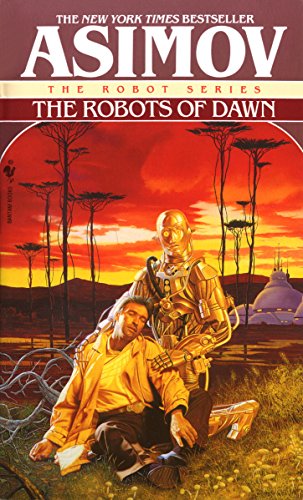
![]() The Robots of Dawn by Isaac Asimov
The Robots of Dawn by Isaac Asimov
The Robots of Dawn is the third book in Isaac Asimov’s trilogy about investigator Elijah Bailey and his robot sidekick R Daneel Olivaw. In the first book, The Caves of Steel, the pair met and solved a murder mystery on Earth. In this far-future Earth, a fearful populace lives in domed cities and never ventures outside. In the second book, The Naked Sun, Elijah faces his fears and actually leaves Earth to solve a murder that occurred on a planet that has such low population density that the inhabitants have evolved a disgust for their fellow humans. When Elijah returns to Earth, he’s determined to use his new-found courage to inspire others to go outside the domes and even think about leaving Earth someday. He thinks that colonizing other planets is the only way that the human race on Earth can survive.
In this final volume, The Robots of Dawn, we find Elijah working outside the dome and hoping that his son will be one of the pioneers who will lead humans out into the galaxy again. Then Elijah gets called into headquarters where he’s told he has to go to another colonized planet (Aurora) to solve yet another murder mystery. This time, however, it’s a robot who has been murdered. The prime suspect, a famous roboticist, admits that he’s the only person who could have committed the crime, yet he claims he’s innocent. If Elijah and R Daneel can’t prove him innocent, it will have bad consequences for Elijah’s career and for Earth’s ability to launch themselves into the galaxy. Daneel is also in mortal (if I can say that) danger.
 As was the case with the previous novels in this trilogy, I enjoyed the murder mystery. It’s complicated and takes a lot of effort to solve, especially because Elijah is working in a political and social culture that he doesn’t understand. (Although this actually lets him see some things more clearly.) I also appreciated some of Asimov’s inventions (virtual reality bathrooms — cool!) and the discussions about language (e.g., how specific words can change our perception of events), art, affection (e.g., the importance of human touch), sex, jealousy and love (e.g., how cultural attitudes about sex change how we feel about love — very interesting). By the way, The Robots of Dawn was written in 1983, 27 years after The Naked Sun, and this frank discussion of sex is new for Asimov (and not at all romantic).
As was the case with the previous novels in this trilogy, I enjoyed the murder mystery. It’s complicated and takes a lot of effort to solve, especially because Elijah is working in a political and social culture that he doesn’t understand. (Although this actually lets him see some things more clearly.) I also appreciated some of Asimov’s inventions (virtual reality bathrooms — cool!) and the discussions about language (e.g., how specific words can change our perception of events), art, affection (e.g., the importance of human touch), sex, jealousy and love (e.g., how cultural attitudes about sex change how we feel about love — very interesting). By the way, The Robots of Dawn was written in 1983, 27 years after The Naked Sun, and this frank discussion of sex is new for Asimov (and not at all romantic).
Asimov fans will be particularly interested in how this novel connects with his earlier robot stories (Susan Calvin is mentioned) and his famous FOUNDATION series. The accused roboticist is motivated to build a model of the human brain so that he can pursue the concept of “psychohistory” that underlies the FOUNDATION novels. Asimov is interested in the evolution of the human brain and the resulting changes in human behavior. As a neuroscientist and psychologist, I love to think about these things but I just can’t believe in any of Asimov’s ideas about the future of humanity. This has been a problem for me with this entire series and the FOUNDATION series, too. I find it interesting, but I just can’t believe it. However, I realize that I’m probably just taking it too seriously because it happens to be my area of expertise. So maybe shame on me. Maybe I just need to chill.
I listened to the audio version read by William Dufris who, again, does a great job. He always does a great job.







>I just can’t believe in any of Asimov’s ideas about the future of humanity
What? Not even the idea that humans have a latent capacity for telepathy that will become fore fully expressed in the future?
Tee hee.
Asimov gave telepathy a central role in the amazing mashup of his Robot and Galactic Empire sagas. We don’t have to believe that humans have telepathic abilities to play along with Asimov’s great “what if?” game.
There is one great puzzle remaining after Asimov’s final chapter in “Robots of Dawn”. Giskard refuses to tell Baley how it was possible for Vasilia to endow Giskard with telepathic powers. Sadly, Asimov dies before he was able to provide us with a satisfying solution to that mystery.
Well, it’s funny, I guess, but I’m perfectly willing to suspend disbelief for Asimov’s SF ideas such as telepathy and artificial intelligence. It’s his anthropology I have such a hard time with. :)
Thanks for the comment, John. And I enjoyed visiting your blog!